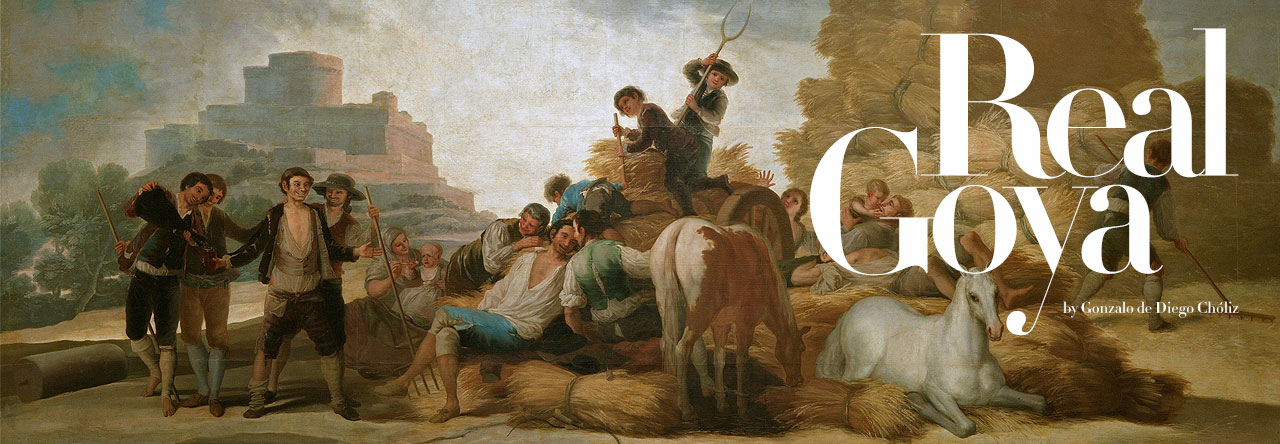Goya in Literature.2
January 2015
In our section dedicated to Goya in Literature we present this second episode, devoted to a great Irish poet, perhaps not too widespread in Spain, with a difficult reading by its erudition and its complexity alike but of a high poetic flight. Heir of the great poets like Ted Hughes, Patrick Kavanagh and Robert Frost. Goya now brings us to his figure and his work.
SEAMUS HEANEY was born in Derry County, Northern Ireland, in 1939. He was a professor at Harvard and Oxford. He received the Nobel Prize for Literature in 1995. He died in Dublin on August 30th 2013.
Vast is the poetic work of Heaney, but here we will only refer to his book North, a landmark in the whole of his work book. And more precisely to the poem ‘Summer of 1969’.
In the foreword of the book, Margarita Ardanaz, to who is due the translation, says: “…Be Irish and Ulster conditions, without a doubt, any artist’s career. Be proud of one of the oldest and most successful of the Indo-European world literary traditions and, at the same time, joining England from the point of view of the political administration, education and language is one of the conflicts which, in a recurrent way, appear in his work. ”
“…North is the emblem, summarized in a unique and unambiguous word, of at least three fundamental aspects in the history of Great Britain: the North always indomitable, brave, industrial and working-class where both the religious radicalism and trade unionists and labour movements have settled; the Danish North of the British Islands, influenced by the culture of the Nordic-German people and colonised by the relentless Vikings warriors; the North, i.e., Ulster, of an Ireland divided against the will and the heart of many”.
Violence, love and death are always present. Poetics and politics, past and present constitute the plot of his language. About an extraordinary lyricism are his poems dedicated to his mother, his friends, his beloved, to the land, the Nature highlighted. The marshes, the peat, the marsh, the swamp, the traditions (the betrothal of Cavehill). Heaney kneads his poems with the material of childhood, of rural areas, in the poem ‘The Seed Cutters, he says…
“They seem hundreds of years away. Brueghel,
You’ll know them if I can get them true…”
Margarita Ardanaz continues: “…”Highlights in this book text inspired in archaeological finds, especially persons mummified in mobs of slough, in which the poet update the past and links centuries and the flow with his own life, both sentimental and intellectually”.
The bloodshed, The Violent Deaths without Revenge, The Archaeologies in Belderg, Funeral Rites, Bone Dreams, Bog Queen, The Grauballe men, Strange Fruit, Punishment, belonging to the first part of the book.
In the second part gets fully in politics and the conflict in Ulster.
The Unacknowledged Legislator´s Dream
“…My wronged people cheer from their cages”.
Whatever You Say, Say Nothing
“…The “voice of sanity” is getting hoarse…”
IV “…This morning from a dewy motorway
I saw the new camp for the interness:
A bomb had left a crater of fresh clay
In the roadside, and over in the trees
Machine-gun posts defined a real stockade….”
Under the heading ‘School of Singing’, threre are in this second part of the book memorable poems where Heaney put naked the violence, police repression and fear.
- The Ministry Of Fear
“…Ulster was British, but with no rights on
The English lyric: all around us, though
We haden´t named it, the ministery of fear.”
And we arrived in Summer of 1969
The Spanish translation is by Vicente Forés and Jenaro Talens, posted in ‘Opened ground. Poetic Anthology (1966-1996)’, by Seamus Heaney, Visor Libros, Madrid, 2004
While the Constabulary covered the mob
Firing into the Falls, I was suffering
Only the bullying sun of Madrid.
Each afternoon, in the casserole heat
Of the flat, as I sweated my way throug
The life of Joyce, stinks from the fishmarket
Rose like the reek off a flux-dam.
At night on the balcony, gules of wine,
A sense of children in their dark corners,
Old women in black shawls near open windows,
The air a canyon rivering in Spanish.
We talked our way home over starlit plains
Where patent leather of the Guardia Civil
Gleamed like fish-bellies in flax-poisoned waters.
‘Go back;’ one said, ‘try to touch the people.’
Another conjured Lorca from his hill.
We sat through death-counts and bullfight reports
On the television, celebrities
Arrived from where the real thing still happened.
I retreated to the cool of the Prado.
Goya’s ‘Shootings of the Third of May’
Covered a wall – the thrown-up arms
And spasm of the rebel, the helmeted
And knapsacked military, the efficient
Rake of the fusillade. In the next room,
His nightmares, grafted to the palace wall
Dark cyclones, hosting, breaking; Saturn
Jewelled in the blond of his own children,
Gigantic Chaos turning his brute hips
Over the world. Also, that holmgang
Where two berserks club each other to death
For honour’s sake, greaved in a bog, and sinking.
He painted with his fists and elbows, flourished
The stained cape of his heart as history charged.
*Falls Road: it is a Belfast Street famous for its status as dividing line between the Protestant and the Catholic area. (Notes to the translation)
With this poem we approach to the figure of Goya and his painting through the voice of a poet for whom the word was a campaign (the voice that reverberates and expanded), a poet committed to his country and its people, with the man’s struggle for freedom.
Silvia Pagliano

Leave a Reply